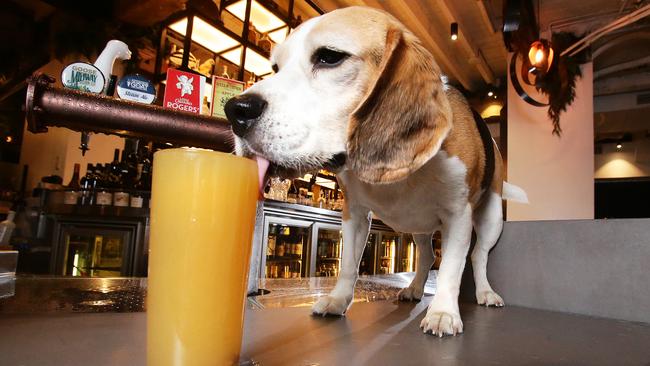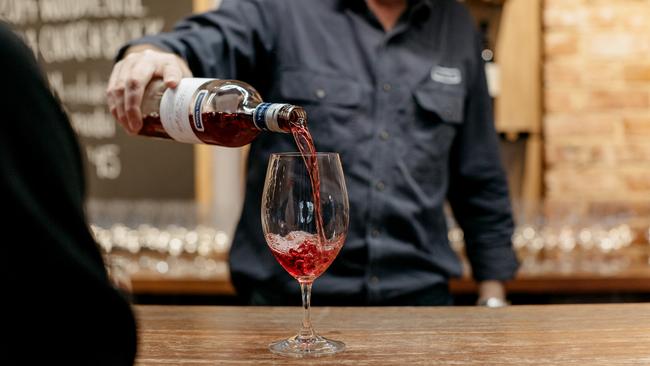Alcohol is not a dirty word
AUSTRALIANS have turned self-loathing about alcohol into a national sport, writes James Morrow. So we enjoy a drink or two. That’s no reason to turn it into the bogeyman.
Rendezview
Don't miss out on the headlines from Rendezview. Followed categories will be added to My News.
IS anyone else getting tired of hearing how big a problem Australia has with alcohol?
It seems like barely a week goes by without someone or other bemoaning that fact that as a nation we like to have a drink or two.
Take my RendezView colleague Koraly Dimitriadis, who yesterday offered up her opinion that Australia is a place where “even a school picnic is a piss-up”. Having recently been to an event at her kid’s school, she laments that the BYO affair involved parents bringing their own B’s, causing her friend to ask, “Why is there alcohol here?”
Of course it’s not the parents’ drinking she’s concerned about, not directly.
Instead, Dimitriadis says she is worried that by drinking in front of the little ones, parents might “be giving kids the wrong idea about booze”.
Put aside just what that “wrong idea” might be (adults like to have a wine or a beer when they have a chat in a social situation?), it’s a neat trick.
Because by turning the situation around, she’s managed to sneak through a won’t-somebody-think-of-the-children argument to take aim at the actions of ordinary adults enjoying a legal drink and not, as far as anyone can tell, hurting anyone.
This faddish concern that kids might see adults “model” drinking is bit reminiscent of the public health campaign a few years ago which showed generations of fathers — all apparently employed, sociable, nonviolent sorts who also managed to keep a roof over the family’s head — asking their sons to fetch them a beer.

This perfectly normal activity was presented in the same sort of tones as if the dads were ordering the boys to fetch their Klan robes off the Hill’s Hoist and get ready for the evening’s cross burning.
But here’s the thing: of course alcohol is a part of Australian culture. It is a part of pretty much every Western culture, and plenty of non-Western ones as well. And actually, that’s all to the good.
The discovery, perhaps by accident, of beer thousands of years ago gave humans something safer to drink than water. Because of this people could settle closely together in what would eventually become cities — providing the critical mass of minds behind virtually every advance in civilisation for the past four or five millennia.
Both a depressant and a stimulant, alcohol has helped countless people fall in love — and consoled countless more when it has all gone wrong.
A bracing cocktail at the end of a long day tells the brain it’s time to lower the flaps and come in for a landing.
A great wine can enhance both food and conversation. Just ask the Europeans, who manage to enjoy life without this sort of hand-wringing. Oh, and while we’re at it, going to wineries — particularly those with great restaurants attached — is not just a lot of fun, but also a great source of tourism revenue for regional communities.
And a couple of beers surely got a more than a few of Dimitriadis’s fellow parents through the awkward stand-around ritual of a school function where no one really knows each other except by the reputation of their offspring (“Oh, your kid’s the biter? Yeah, nah, our boy was fine with tetanus shot, no worries”).

None of these pleasures is ever accounted for in the various alarmist reports about the many billions alcohol purportedly costs Australia.
Indeed, if alcohol is such a font of misery, you’d expect bone-dry Saudi Arabia to top the league tables in all those world happiness indexes.
Likewise, if we as a nation did succeed in “de-normalising” the stuff, would that be any better?
When alcohol is normalised, it’s consumed in moderation. When it’s forbidden fruit, it becomes either an excuse for a binge — as most people who’ve survived their teenage years will tell you — or an empowerment for tut-tutting neo-Puritans to wag their finger at anything more than a Christmas thimble of sherry.
Of course there are people who shouldn’t drink. Many have had their lives ruined by alcohol. And all things in moderation. Get on the turps too much, too often, and you’ll probably wreck your health, your family, and your career.
That said, similar things can be said about dangerous pastimes from horse riding to skydiving to commuting to work on a motorbike, but we don’t choose to freight those activities with a first class allowance of moral baggage.
In the end, perhaps the best lesson for kids about alcohol and so much else is that once offered up by the great British novelist Kingsley Amis: “No pleasure is worth giving up for the sake of two more years in a geriatric home in Weston-super-mare”.
James Morrow is the opinion editor of the Daily Telegraph.



